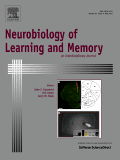
LEARNING & MEMORY
Scope & Guideline
Advancing Knowledge in Learning and Memory
Introduction
Aims and Scopes
- Behavioral Mechanisms of Learning and Memory:
Investigates how different learning paradigms influence memory formation and retrieval, highlighting the role of experience and environment in shaping cognitive abilities. - Neurobiological Foundations:
Explores the neural circuits and molecular mechanisms underlying learning and memory, with a strong emphasis on synaptic plasticity, neurotransmitter systems, and brain region interactions. - Comparative Studies Across Species:
Utilizes a diverse range of model organisms, including insects, rodents, and humans, to draw parallels and contrasts in learning and memory processes, fostering a broader understanding of cognitive functions. - Impact of Emotional and Contextual Factors:
Examines how emotions, stress, and contextual variables affect memory encoding, consolidation, and retrieval, revealing the complexities of memory in real-world scenarios. - Technological Innovations in Memory Research:
Incorporates advanced methodologies such as optogenetics, chemogenetics, and neuroimaging to elucidate the dynamics of memory processes and develop new experimental paradigms.
Trending and Emerging
- Neural Circuitry and Memory Dynamics:
A growing emphasis on understanding the specific neural circuits involved in learning and memory processes has emerged, with studies utilizing modern techniques like optogenetics to manipulate and observe these networks in real-time. - Sleep and Memory Consolidation:
Research focusing on the role of sleep in memory consolidation has gained traction, highlighting how different sleep stages contribute to the strengthening of memories and the mechanisms involved. - Sex Differences in Learning and Memory:
An increasing number of studies are exploring how sex differences influence learning and memory processes, addressing gaps in understanding how biological and hormonal factors contribute to cognitive function. - Emotional Influences on Memory:
The impact of emotional states on memory processes, particularly how emotions can enhance or impair memory retention and retrieval, has become a prominent area of investigation, reflecting broader psychological interests. - Contextual and Environmental Factors:
Research is increasingly focusing on how contextual cues and environmental changes affect memory performance, emphasizing the importance of situational factors in cognitive processes.
Declining or Waning
- Basic Associative Learning Mechanisms:
While foundational studies on classical and operant conditioning remain important, there appears to be a shift towards more complex models that integrate emotional, contextual, and neural dimensions, leading to fewer publications focusing solely on basic associative learning. - Pharmacological Interventions in Memory Enhancement:
Research centered on the use of pharmacological agents to enhance memory has diminished, possibly as the field moves towards understanding the underlying neural circuits rather than simply testing drug effects. - Age-Related Memory Decline:
Although age-related cognitive decline is still relevant, the specific focus on this theme has waned in favor of broader explorations of developmental and contextual influences on memory across the lifespan. - Traditional Memory Assessment Techniques:
As the field embraces more sophisticated and nuanced approaches to studying memory, traditional assessment methods are being used less frequently, leading to a decline in publications centered around these conventional techniques.
Similar Journals

Cognitive Research-Principles and Implications
Pioneering Discoveries in Experimental Psychology.Cognitive Research: Principles and Implications, published by SPRINGER, is a premier open-access journal dedicated to the dynamic field of cognitive neuroscience and experimental psychology. Since its inception in 2016, this journal has rapidly established itself as a leading platform for disseminating innovative research, achieving impressive rankings of Q1 in both Cognitive Neuroscience and Experimental and Cognitive Psychology in 2023. With a Scopus ranking of #16 out of 165 in Experimental and Cognitive Psychology and #28 out of 115 in Cognitive Neuroscience, it serves as a vital resource for researchers and practitioners eager to explore the intricacies of cognitive processes. Operating from its base in the United Kingdom, the journal offers open access to its articles, ensuring that groundbreaking research is widely available and can influence both academic inquiry and real-world applications. As the field continues to evolve, Cognitive Research: Principles and Implications remains an essential reference point for advancing understanding in cognitive science, making it an indispensable tool for students, professionals, and academics alike.

EXPERIMENTAL BRAIN RESEARCH
Illuminating the Path to Understanding Brain MechanismsEXPERIMENTAL BRAIN RESEARCH is a renowned journal published by SPRINGER, dedicated to advancing understanding in the field of neuroscience. With a history dating back to 1966, this journal offers valuable insights into the mechanisms of brain function and neurological disorders, making it a vital resource for researchers, professionals, and students alike. While it currently holds a Q3 classification in the field of Neuroscience (miscellaneous) and ranks #73 out of 113 in Scopus's General Neuroscience category, it continually contributes to fostering innovative research and collaborative dialogue. The journal is not open access, ensuring that although content is subscription-based, it maintains a high standard of peer review and scholarly rigor. By covering a breadth of topics relevant to both experimental and theoretical aspects of brain research, EXPERIMENTAL BRAIN RESEARCH serves as an essential platform for disseminating cutting-edge discoveries and theories in the dynamic realm of neuroscience.

COGNITIVE AFFECTIVE & BEHAVIORAL NEUROSCIENCE
Enhancing Knowledge: Investigating the Interplay of Mind and BehaviorCOGNITIVE AFFECTIVE & BEHAVIORAL NEUROSCIENCE (ISSN: 1530-7026, E-ISSN: 1531-135X) is an esteemed journal published by SPRINGER that aims to advance the understanding of the interplay between cognitive processes, affective states, and behavioral responses in the field of neuroscience. Established in 2001, the journal provides a rigorous platform for disseminating high-quality research, with a significant focus on both Behavioral Neuroscience and Cognitive Neuroscience. Classified in Q1 and Q2 quartiles for 2023, it ranks highly within its categories, holding positions of #37 out of 88 and #46 out of 115 respectively in the Scopus listings. Although not an open-access publication, readers can access a wealth of valuable insights and innovative findings that enrich the scientific community's understanding of brain function and behavior. The journal's emphasis on interdisciplinary research contributes to its esteemed reputation, making it a vital resource for students, researchers, and professionals striving to explore the complex nature of the human mind and behavior.

NEUROBIOLOGY OF LEARNING AND MEMORY
Transforming Insights into Learning and Memory NeuroscienceNeurobiology of Learning and Memory is a prestigious journal dedicated to the exploration of the neural mechanisms underlying learning and memory processes. Published by Academic Press Inc Elsevier Science, this journal boasts a strong reputation within the field, as evidenced by its impressive impact factor and high quartile rankings in multiple categories, including Q1 in Behavioral Neuroscience and Q2 in Cognitive Neuroscience. Having provided a platform for groundbreaking research since its inception in 1995, the journal aims to disseminate influential findings that further our understanding of cognitive processes, shaped by robust empirical studies and theoretical developments. Researchers and professionals in neuroscience, psychology, and related disciplines will find invaluable insights and advancements that underscore the journal's commitment to fostering knowledge and innovation within these fields. While it currently operates under a subscription model, its comprehensive coverage of crucial topics positions it as a vital resource for those engaged in the intricate study of learning and memory.

Behavioral and Brain Functions
Unlocking the Mysteries of the Human MindBehavioral and Brain Functions is a leading Open Access journal published by BMC, dedicated to advancing the field of behavioral neuroscience, cognitive neuroscience, and biological psychiatry since its inception in 2005. This esteemed journal, based in the United Kingdom, has established itself as a vital resource for researchers and professionals, boasting a remarkable influence demonstrated by its Q1 and Q2 rankings across multiple relevant categories. With its commitment to providing unrestricted access to high-quality research, the journal facilitates the dissemination of significant findings in understanding the complex interactions between behavior and brain function. The journal ranks impressively within the Scopus database, positioning itself among the top-tier publications in its categories, making it an essential platform for academic discourse and innovation. As it converges through 2024, Behavioral and Brain Functions continues to play a crucial role in shaping the forefront of neuroscientific inquiry, inviting contributions that challenge our understanding and promote further exploration in these dynamic fields.

Journal of Cognitive Science
Unraveling the Mysteries of the MindThe Journal of Cognitive Science, with ISSN 1598-2327, is a distinguished publication from SEOUL NATL UNIV, INST COGNITIVE SCIENCE, focusing on the multidisciplinary field of cognitive science. Established in 2016, this journal aims to advance knowledge in various domains, including Artificial Intelligence, Cognitive Neuroscience, and Experimental Psychology, while also delving into Linguistics and Language. Although currently categorized in Q4 for several subjects in the 2023 rankings, it presents an invaluable platform for innovative research and scholarly discourse, providing insights that connect cognitive processes with practical applications, thus fostering cross-disciplinary collaboration. Located in South Korea, the journal adheres to rigorous academic standards, inviting submissions that contribute significantly to understanding cognition in a digital age. While it does not offer Open Access, readers can access articles through university libraries and academic databases, engaging with the latest findings and theories that shape the future of cognitive science.

Neuropsychologia
Charting New Territories in Experimental Psychology and NeuroscienceNeuropsychologia, published by PERGAMON-ELSEVIER SCIENCE LTD, is a premier journal that delves into the intersections of psychology and neuroscience, specifically focusing on behavioral and cognitive processes. Since its inception in 1963, this esteemed journal has been a vital platform for researchers, professionals, and students, showcasing innovative studies and advancements in the fields of Behavioral Neuroscience, Cognitive Neuroscience, and Experimental Psychology. With a commendable impact factor, placing it in the Q2 category across multiple disciplines, Neuropsychologia is recognized for its contribution to the scientific community, ranking among the top journals in both Experimental and Cognitive Psychology and Neuroscience. The journal's commitment to excellence is evident in its rigorous peer-review process and its mission to disseminate cutting-edge research, making it an invaluable resource for those seeking to expand their knowledge and insights in neuropsychology. For further reading, the journal is accessible in both print and digital formats, ensuring that researchers can easily engage with the latest findings and theoretical advancements in this dynamic field.

BRAIN BEHAVIOR AND EVOLUTION
Charting the Evolutionary Landscape of BehaviorBRAIN BEHAVIOR AND EVOLUTION, with ISSN 0006-8977 and E-ISSN 1421-9743, is a prominent journal dedicated to the intricate connections between brain function, behavior, and evolutionary processes. Published by KARGER in Switzerland, this journal has established itself as a crucial resource in the fields of Behavioral Neuroscience and Developmental Neuroscience, evidenced by its respectable 2023 category quartiles of Q2 and Q3, respectively. With a rich publication history spanning from 1968 to 2024, BRAIN BEHAVIOR AND EVOLUTION presents original research articles, reviews, and theoretical contributions that investigate the biological underpinnings of behavior, making it an essential platform for researchers, professionals, and students committed to advancing our understanding of neurobiological and evolutionary mechanisms. Although it is not an open-access journal, its rigorous peer-review process ensures that only high-quality research is disseminated, maintaining the journal's impact in the academic community.

JOURNAL OF MEMORY AND LANGUAGE
Unlocking the Secrets of Cognitive ConnectionJOURNAL OF MEMORY AND LANGUAGE, published by Academic Press Inc Elsevier Science, is a prestigious journal dedicated to advancing the understanding of cognitive processes related to language and memory. With an impact factor that underscores its authority and relevance, the journal has achieved remarkable recognition, ranking in the Q1 quartile across multiple disciplines such as Artificial Intelligence, Experimental and Cognitive Psychology, Linguistics and Language, and Neuropsychology and Physiological Psychology, as of 2023. With its origins tracing back to 1985, the journal continually provides a platform for high-quality research and innovative studies that intersect diverse fields including cognitive science and linguistics. Although it does not offer open access, the Journal of Memory and Language serves as an essential resource for researchers and professionals seeking to explore the intricate interplay between memory and language. Make sure to access state-of-the-art research that not only informs theoretical frameworks but also has practical implications in real-world situations.

BEHAVIOURAL BRAIN RESEARCH
Connecting Behavior with Neural MechanismsBEHAVIOURAL BRAIN RESEARCH, published by Elsevier, is a leading scholarly journal that has been at the forefront of research in Behavioral Neuroscience since its inception in 1980. With an ISSN of 0166-4328 and an e-ISSN of 1872-7549, this journal caters to a global audience of researchers and professionals keen on exploring the intricate relationships between behavior and neural processes. As of 2023, it holds an impressive Q2 ranking within its category, showcasing its significant impact with a Scopus rank of #28 out of 88 in the field, placing it in the 68th percentile. While the journal does not offer open access, it remains accessible through institutional subscriptions, ensuring that its high-quality research is disseminated effectively. The journal's commitment to advancing knowledge in behavioral neuroscience makes it an indispensable resource for those looking to delve deep into the complexities of brain-behavior interactions and foster innovative approaches in both research and clinical applications.